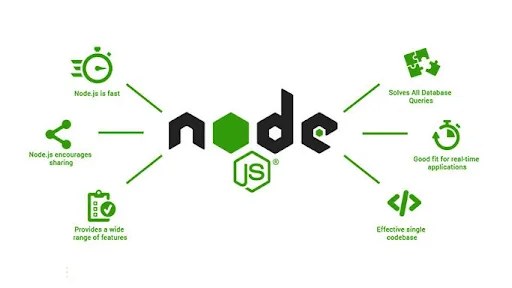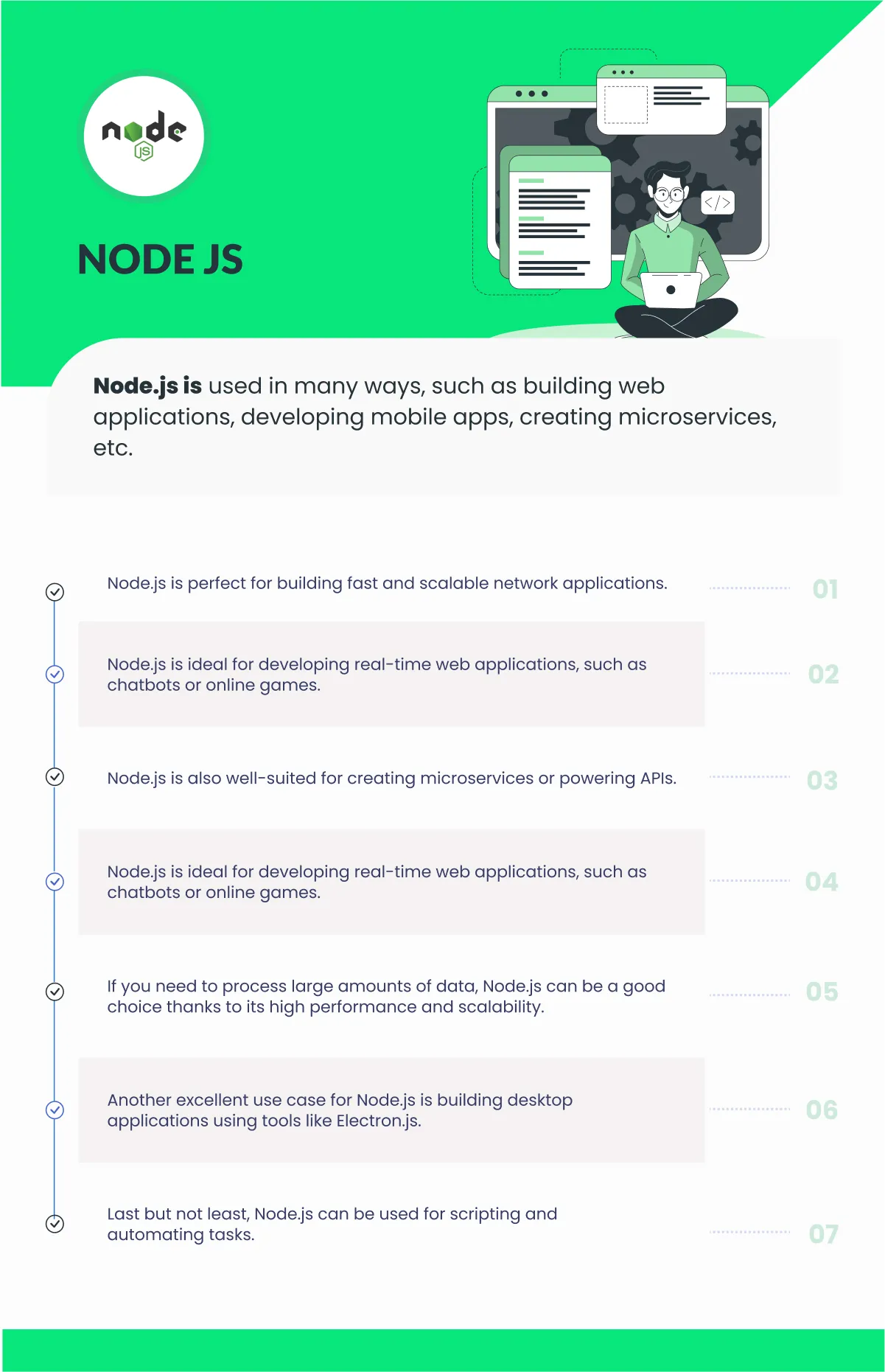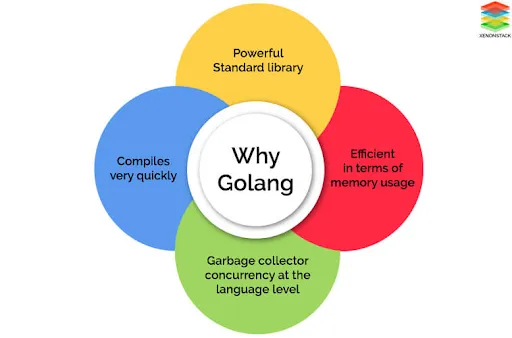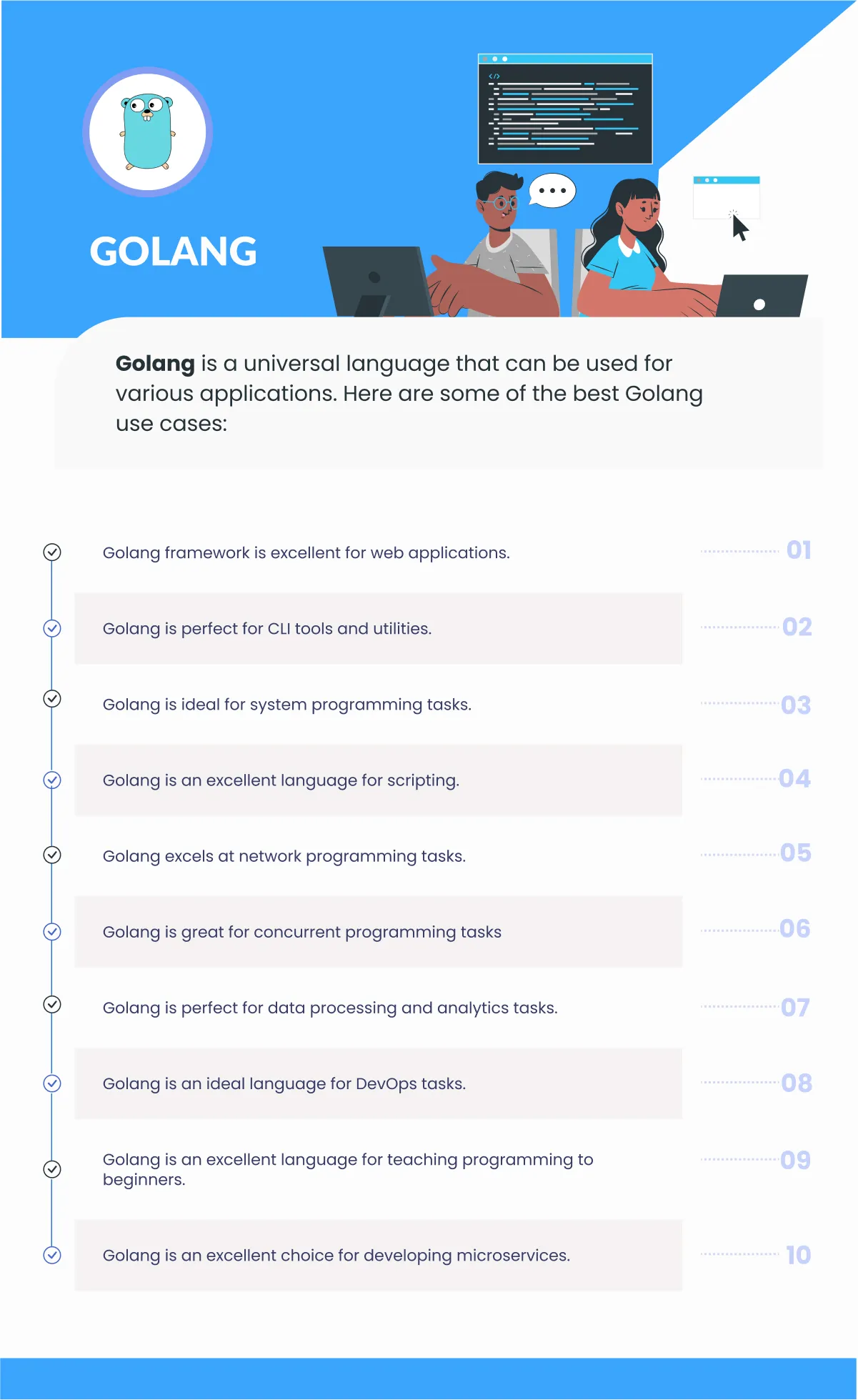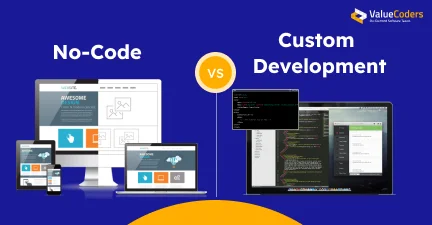Node.js and Golang are two open-source platforms that can be used to create powerful web apps, games, and other web tools, but which one should you choose?
Both Node.js and Golang framework have their strengths and weaknesses, so it’s critical to find out their differences before deciding.
This article breaks down the main differences between Node.js vs. Golang and helps you decide which platform to use on your next project.
Node.js – An Overview
It is a powerful JavaScript-based platform that enables developers to easily create fast and scalable network applications. Node.js applications are event-driven, making them highly scalable & efficient.
Moreover, it is a perfect platform for data-intensive real-time applications that require low latency and high throughputs, such as chatbots, online gaming, and live video streaming. It is an open-source, cross-platform runtime environment that helps in developing server-side & networking applications.
Node.js apps are written in JavaScript language. It can run within the Node.js runtime on OS X, Microsoft Windows, Linux, FreeBSD, NonStop, IBM AIX, HPE NonStop, and IBM z/OS.
Moreover, it also provides a rich library of various JavaScript modules that simplifies the development of web applications using Node.js.
Features
Node.js is fast and scalable. Its applications are event-driven and can be easily programmed to efficiently handle large amounts of data and traffic. It is perfect for real-time applications such as chatbots, online gaming, and live video streaming. It is an easy-to-use platform.
Node.js is an open-source runtime environment, and you can get started with Node.js development easily using the Node package manager (npm). Node.js also has a large and supportive community that can help you in your development journey.
Node.js’ Notable Features
Asynchronous and Event-Driven
All APIs of Node.js is asynchronous, that is, non-blocking. It essentially means a Node.js-based server never waits for an API to return data. The server moves to the next API after calling it, and a notification mechanism of Events of Node.js helps the server get a response from the previous API call.
So, it makes Node.js highly scalable, as it can process a high number of requests without waiting for an API to return data.
Single-Threaded but Highly Scalable
Node.js uses a single-threaded model with event looping. The event mechanism helps the server respond in a non-blocking way and makes the server highly scalable. Node.js uses the concept of the observer pattern.
The node creates a small task and adds it to the event table when an API is called. Whenever an event occurs, its corresponding function gets executed. So, Node utilizes all the CPU cores available, making Node.js highly scalable.
Make informed decisions for efficient backend development and optimal web performance.
Fast
Node.js is built on Google Chrome’s V8 JavaScript Engine, making it fast.
Supports Web Sockets
Node.js supports web sockets and two-way communication between the server and the client. Node.js uses the WS module for supporting web sockets.
Node Package Manager (npm)
npm is a package manager for JavaScript, and it gets installed automatically with Node. It consists of open-source libraries available in the npm repository. npm makes it easy to install and manage Node packages.
Intuitive and Easy to Use
Node.js comes with many built-in modules, making it easy to develop applications. The modules provide all the necessary functionality, from file system to networking, making Node.js intuitive and easy to use.
Also Read: How to Make a Choice Between NodeJS and Python
Rich Ecosystem
Node.js has a rich ecosystem with a vast number of modules and tools available that makes Node.js development efficient and fast. Some of the popular tools are Express.js, Socket.IO, Passport.js, etc.
Open Source
Node.js is released under the MIT license. Node.js is an open-source platform, and hence, it is free to use. Also, Node.js has an extensive developer community, which is constantly working on improving Node.js and adding new features to it.
Note: If you want to hire Node.js developers to build a web app for your business, look no further than ValueCoders. With over 17+ years of experience in building high-quality web applications, our team of Node.js developers can help you make a scalable Golang suitable for the backend?le, real-time application for your business. Contact us!
Best Node.js Usecases to Consider in the War of Node.js vs. Golang
Some Of The Best Use Cases For Node.js Include
- Web Applications: Node.js builds highly scalable and real-time web applications. Examples of popular web applications built with Node.js include Netflix, LinkedIn, and eBay.
- Mobile Apps: Node.js can develop cross-platform mobile apps using tools like React Native or Apache Cordova.
- Microservices: Node.js is best for developing microservices due to its lightweight nature and ability to handle large amounts of data.
- IoT: Node.js builds applications for the Internet of Things (IoT). Its event-driven architecture makes it ideal for real-time handling of data from devices.
- Robotics: Node.js can control robots and other physical devices using frameworks like Cylon.js and johnny-Five. )
Golang framework- An Overview
- It is also known as Go and is a programming language created by Google. Golang is a statically typed, compiled language with syntax similar to C.
- Golang was designed with systems programming in mind. It has features and characteristics that make it well-suited for writing code that needs to run quickly and efficiently.
- Golang’s focus on speed and efficiency makes it an attractive choice for writing code for things like network servers and command-line tools. Golang is also becoming increasingly popular for writing web applications.
- One of the things that makes Golang attractive for web development is its ease of use. Golang’s standard library includes everything you need to start building web applications. Golang’s syntax is clean and easy to read, and Golang’s standard library has all the tools you need to get started.
Hence, the Golang framework is also swift, and it can handle a lot of traffic without slowing down.
Harness the power of the right backend for optimal web development.
Features
Golang is a compiled, statically typed language created by Google. It is similar to C in syntax and semantics but with some crucial differences. Golang was an efficient, reliable, and concurrent programming language.
Notable Features Of Golang
Concurrency
Golang’s concurrency model is based on goroutines, which are lightweight threads of execution. Goroutines can be used to run multiple tasks concurrently.
Memory safety
Golang is a memory-safe language. Hence, it is not possible to write programs that will cause memory leaks or buffer overflows.
Garbage collection
Golang framework has a garbage collector that reclaims memory from unused objects. This helps keep program memory usage low and helps prevent memory leaks.
Fast compile times
Golang programs compile quickly, even large programs. This makes it suitable for developing large applications.
Cross-platform
Golang develops applications for multiple platforms, including Linux, macOS, and Windows. Golang programs can also be run on various architectures, including x86, ARM, and PowerPC.
Open-source
Golang is an open-source programming platform with a permissive license. This means that the Golang language is best for various applications, from commercial software to open source projects.
Must Note: If you’re looking for a programming language between Node.js vs. Golang that is fast, efficient, and easy to use, Golang is a great choice. Moreover, you can hire dedicated Golang developers in India from ValueCoders, a leading Golang development company to date.
Also Read: PHP vs. Node.JS : Which Is Better For Backend Development?
Best Golang Use Cases: What’s Possible With Go?
- Creating web applications: Golang is an excellent choice for creating web applications. It has a powerful built-in library, which makes it easy to develop complex web applications.
- Developing system tools: Golang develops system tools such as command-line utilities and daemons. Its simple syntax and robust libraries make it an ideal choice for this purpose.
- Building large-scale distributed systems: Golang builds large-scale distributed systems. Its concurrency features make it easy to write code that can run efficiently on multiple cores.
- Creating cross-platform applications: Golang framework creates cross-platform applications that run on multiple operating systems. This is possible because Golang compiles into native binaries for different platforms.
- Writing command-line utilities: Golang is ideal for writing command-line utilities. Its simple syntax and robust libraries make it easy to develop these kinds of applications.
These are just some of the best Golang use cases. There are many other exciting ways in which Golang works efficiently. So if you are looking for a universal language for a wide range of applications, then Golang is worth considering.
When Should You Choose Each One Over The Other In The War Of Node.js Vs. Golang?
The short answer is that it depends on your project. At first glance, they may seem similar: both are open-source (you can see their entire codebases on GitHub), and both have a great deal of support and community growth.
While all of these things do matter, there are many reasons why you might choose one over another, depending on your specific application and needs.
Here’s a look at some of the considerations to think about when choosing one framework over another in the war of Node.js vs. Golang
There are many parameters to consider when comparing Node.js and Golang. Some of the most important ones include performance, scalability, ease of use, learning curve, and community support.
In terms of performance, Node.js is generally faster than the Golang framework. This is due to Node’s event-driven architecture, which allows it to handle concurrent tasks more efficiently. Golang is also a swift language, but its concurrency model can sometimes lead to lower overall performance.
Scalability is another important consideration when comparing these two languages. Node.js is highly scalable due to its asynchronous nature, which allows it to handle large numbers of concurrent connections with relative ease. Golang is also scalable, but its concurrent model can sometimes make it more challenging to scale up.
Ease of use is another crucial difference between Node.js and Golang. Node.js is typically more user-friendly due to its syntax and overall simplicity. Golang is a more complex language, but its strict type system and verbose syntax can actually make it easier to write code that is less error-prone.
The learning curve is another essential factor to consider when comparing Node.js and Golang. Node.js is generally easier to learn due to its popularity and extensive documentation. Golang is a more complex language, but its clear syntax and comprehensive standard library can make it easier to understand for experienced developers.
Community support is another critical difference between these two languages. Node.js has a large and active community, with many resources available for learning and troubleshooting. Golang also has a strong community, but it is smaller and less busy than NodeJS.
Related: Top Object-Oriented Programming Languages
Node.js vs. Golang: The Final Verdict
The question of whether to use Node.js or Golang for your next project depends mainly on how comfortable you are with JavaScript (Node) and how much control you want over your backend logic (Go).
Node.js allows developers to write server-side applications in JavaScript. If you’re looking to build a hybrid web/mobile app and aren’t very familiar with Javascript, it might be best to go with the Golang framework and avoid potential issues like version incompatibility between frontend and backend frameworks.
Both languages have unique features that will draw different developers to each of them, but at some point, you’ll need to choose a language for a project. These three benchmarks will give you a better idea of which technology is best for your next project:
- Time-to-market
- General complexity
- Scalability
For example, if you’re working on an app that needs to launch quickly or has a small team behind it, Node.js is a preferred choice over Go. If you’re working with large data sets or building something scalable, Go may suit more than Node.js. It all depends on what your application needs to succeed—and both are excellent options for building web applications.
Finally, if you want a high-level language that will allow you to write a lot of code quickly (and run it fast), then Node.js might be suitable for you. On the other hand, if performance is more important than sheer speed (for example, if your application will be serving up web pages or API calls), Go might be a better choice.
Also Watch This Video on Node.js vs. Golang:
Related: Top 10 Advantages of Using NodeJS
Conclusion
So, in the war of “Node.js vs. Golang,” which language is better for your business growth?
The answer is simple: It depends on your specific needs.
If you need a language that is easy to learn and has a large ecosystem of libraries and tools, Node.js may be the better option. However, if you need a language that is more efficient and can handle concurrency well, Golang may be the better choice. Ultimately, the decision comes down to what your business needs to grow and succeed.
If you’re not sure for “Node.js vs. Golang” which language to choose, our team of experts can help you make the right decision for your business. Contact us today to learn more about Node.js and Golang framework and find out which language is suitable for your business needs.
Navigate the crossroads of technology with informed decisions for your next project.

